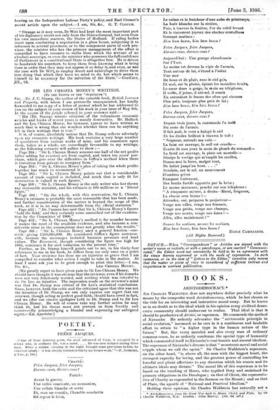SIR LEO CHIOZZA MONEY'S WRITINGS.
(To THE EDITOR OF TnE " SPECTATOR."' -sDr. J. C. Stamp, the author of the valuable book, British Incomes and Property, with whom I am personally unacquainted, has kindly forwarded to me copy of a letter of protest which he has addressed to you on the subject of your review of his work in your issue of May 6th. In the course of the article referred to your reviewer said :—
" His fDr. Stamp] minute criticism of the voluminous economic articles and books of recent years is mainly destructive. Mr. Mallock and Sir Leo Chiozza Money, for instance, appear to have written so much that is wrong that one wonders whether there can be anything left in their writings that is true." It is, of course, absolutely untrue that Dr. Stamp reflects adversely eson my economic writings. His book contains a very large number of quotations from various works of mine, and his comments upon them, taken as a whole, arc exceedingly favourable to my writings, as the following extracts will suffice to show :- Page 394: " Sir L. Chiozza Money assumes one-half of the net profits (after adding for evasion) are from capital, and takes ten years' pur- chase, which gets over the difficulties in Giffen's method when there is transition from private to company form." Page 395: " Sir L. Chiozza Money's plan of taking the whole profits together has much to recommend it."
Page 385: " Sir L. Chiozza Money points out that a considerable amount of trade capital is included, and much that is only fit for destruction is valued in such figures." Page 399: " Sir L. Chiozza Money is the only writer who heti shown any reasonable restraint, and his estimate is 100 millions as a liberal figure.' " Page 404: " On the whole, with this reservation, Sir L. Chiozza Money's estimate is probably the most reasonable that has been made, and further consideration of the matter is beyond the scope of this book, as it is in no way determinable from the official statistics." Page 452 : " Dr. Canaan has said that Sir L. Chiozza Money's figures hold the field,' and they certainly come unscathed out of the examina- tion by the Committee of 1906." Page 453: " Sir L. Chiozza Money's method is far sounder because it makes the most of the available evidence, and also because a con- siderable error in the assumptions does not greatly alter the results."
Page 401 : " Sir L. Chiozza Money used a general fraction—one- sixth—giving E.500,000,000. He considered Giffen's figure unreason- able, because the messuages included business premises and land values. The Economist, though considering the figure too high for 1885, continues it for each valuation to the present time."
Further, as Dr. Stamp himself points out to me, in his thirty-four references to me in his book, he differs from me only once on a point of fact. Your reviewer has done me an injustice so grave that I am compelled to consider what action I ought to take in the matter. At least I must ask you to be good enough to print this letter.—I am,
(We greatly regret to hare given pain to Sir Leo Chiozza Money. We should have thought it was obvious that the reviewer, even if his remarks were not very felicitously worded, said nothing which was intended to do Sir Leo an injustice. The impression made on the reviewer's mind was that Dr. Stamp was critical of Sir Leo's statistical conclusions. Since, however, both the critic and the criticized agree that this was not the intention of Dr. Stamp, we can only express our regret that our reviewer, though acting in perfect good faith, should hare erred in fact, and we offer our sincere apologies both to Dr. Stamp and to Sir Leo Chiozza Money. He will of course take any further action he may think tit, but his threat must not prevent us from frankly and unreservedly acknowledging a blunder and expressing our unfeigned regret.—ED. Spectator.]


































 Previous page
Previous page